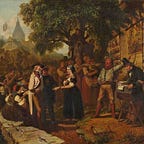Some Turks Question Turkey’s Longstanding Position on Armenian Genocide
The magnitude of the post-coup crackdown led some Turkish people to question the official narrative about some controversial issues of the past.
As another year turned on, with diaspora Armenians desperately seeking to secure the recognition of the events from the country they saw as responsible for the mass atrocities, the definition of what happened in 1915 during the dying days of the Ottoman Empire has still been a matter of political and diplomatic controversy. To master the historical narrative, both sides are jostling to persuade the international audience to accept their account of the events.
To Armenians, the Ottoman Empire executed a premeditated plan to extirpate its Christian citizens. To Ankara, the capital of the successor state — the Turkish Republic — the 1915 episode must be seen in a larger historical context, from a world-historical event — World War One -and what happened was a multifaceted story.
Simply put, the main thesis of the Turkish side is that a lot of Armenians suffered and died, not result of a deliberate genocidal campaign, but because of defensive measures of the Ottoman authorities to blunt separatist Armenian militias’ collaboration with the…
